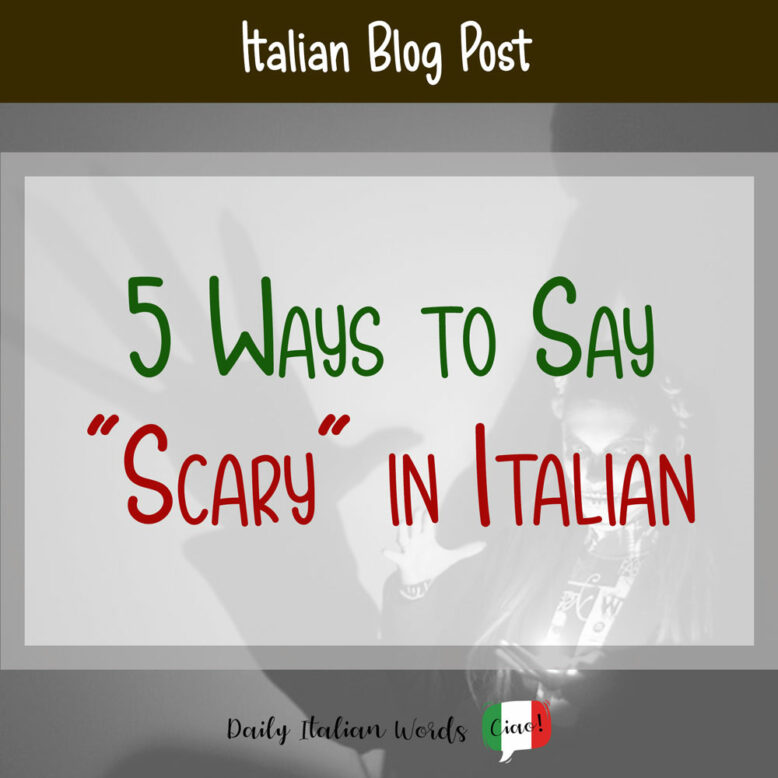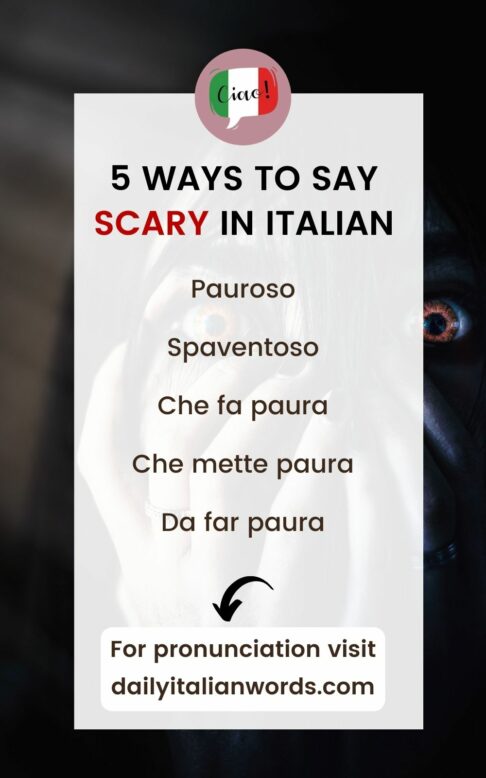Halloween is just around the corner, so what better word to focus on than the adjective that best embodies the spirit of the holiday: scary.
In Italian, there are five principal ways you can translate this word depending on the context. Let’s take a look at them now!

1. Pauroso
Pauroso is one of two adjectives in Italian that means scary or frightening. It comes from the noun paura which means fear.
Questa serie è davvero paurosa. Non so se dormirò stanotte!
This series is so scary! I don’t know if I’ll sleep tonight.
What’s important to know about pauroso is that, somewhat strangely, it can also mean scared or fearful. And when it is used as a noun (un pauroso / una paurosa), it translates as wimp or coward, although you will hear the synonyms un fifone / una fifona more often in colloquial Italian.
È un bambino pauroso.
He’s a fearful child.
In informal Italian, pauroso can also mean incredible or amazing. Here the word is being used to mean the opposite of its traditional meaning, much like wicked and sick in English.
Hai una memoria paurosa, Maria!
You have an amazing memory, Maria!

2. Spaventoso
Spaventoso is a synonym for pauroso, with the difference that it cannot mean scared or fearful. However, it does have the additional meaning of terrible or dreadful.
Che incubo spaventoso che ho avuto ieri notte!
What a scary / terrible nightmare I had last night!
Like pauroso, spaventoso can also be used in a positive sense to mean incredible or extraordinary.
La tua voce è davvero spaventosa! Potresti diventare un cantante di successo!
Your voice is incredible! You could become a successful singer!

Che fa paura
The last three expressions all contain the noun paura (fear).
Che fa paura literally translates as “that makes fear” and is often used as a substitute for the previously mentioned adjectives. In fact, I would say Italians use it more frequently than any of the other expressions mentioned on this list.
When the subject in question is plural, simply change fa to fanno.
È un film che fa davvero paura. Non lo guarderò mai più.
That film is so scary. I’ll never watch it again.
Sono dei film che fanno davvero paura. Non li guarderò mai più.
Those films are so scary. I’ll never watch them again.

Che mette paura
Che mette paura is simply another variation on che fa paura. Mette is the third-person singular of mettere (to put), whereas fa is the third-person singular of fare (to do / to make). When the subject in question is plural, simply change mette to mettono.
Non mi piace guardare da solo i film che mettono paura.
I don’t like watching scary movies by myself.

Da far paura
Da far paura is an expression that appears in emphatic phrases. A somewhat old-fashioned translation would be frightful or frightfully, but in modern-day English, the best equivalent is usually scary.
Monica è intelligente da far paura.
Monica is so intelligent, it’s scary.
(Monica is frightfully intelligent.)
Sembravano così simili da far paura.
They looked so similar that it was scary.
(They were frightfully similar.)
Da far paura shouldn’t be confused with the similar expression da paura, which is a slang term that corresponds to English words like “awesome”, “wicked” or “freaking cool”.
Questa festa è da paura, ragazzi!
This party is awesome, guys!

Heather Broster is a graduate with honours in linguistics from the University of Western Ontario. She is an aspiring polyglot, proficient in English and Italian, as well as Japanese, Welsh, and French to varying degrees of fluency. Originally from Toronto, Heather has resided in various countries, notably Italy for a period of six years. Her primary focus lies in the fields of language acquisition, education, and bilingual instruction.


